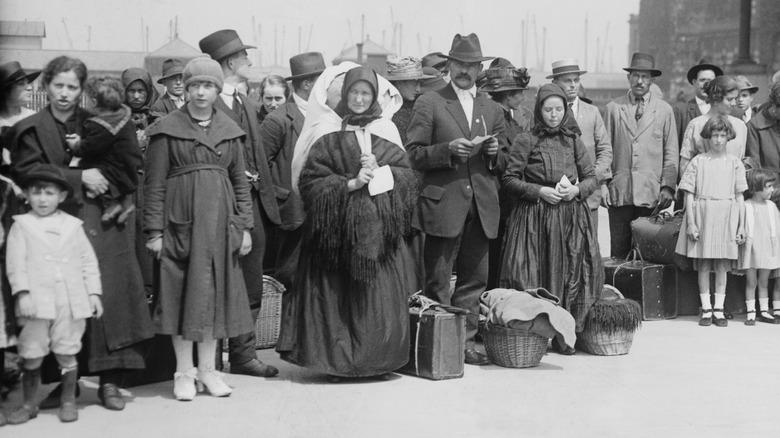The Controversial History Of 'Hunky' Foods
Merriam-Webster defines "hunky" as "attractive and usually well-built," but that word also has a second, lesser known definition with a controversial history. "Hunky" is also defined as "a person of central or east European birth or descent," which specifically includes people from Ukraine, Hungary, Serbia, Croatia, Russia, Slovenia, Slovakia, and the Czech Republic, per The Takeout. These groups of people had their own unique food culture and ways of cooking, referred to sometimes as "hunky" food.
According to the Heinz History Center, Central and Eastern European people began immigrating to Pittsburgh in the mid to late 1800s. Because a lot of these immigrants worked long hours at steel factories, they needed meals that would keep them fueled for the day's work. Cabbage, potatoes, grains, and pork mostly made up their diets, and The Takeout names some classic "hunky" foods as sauerkraut, kielbasa, and pierogi. However, the term has some negative connotations behind it.
'Hunky' was used as a slur toward Central and East European immigrants
While Central and Eastern Europeans immigrated to Pittsburgh in hopes of an easier life with better work opportunities, they were sometimes met with animosity. Pittsburgh locals or "yinzers" often referred to the immigrants as "hunks" and "hunky" (via The Takeout). While Merriam-Webster notes that "hunky" is a dated term, there was some controversy surrounding use of the word in 1990.
Wanting to pay homage to the Central and East European steelworkers who immigrated to Pittsburgh, artist Luis Jimenez crafted a 12-foot statue and positioned it in a park in downtown Pittsburgh. The problem was his inscription, which read "Hunky Steelworker," reported AP News. Labor and ethnic groups, as well as fellow Croatians and the United Steelworkers union, alerted Jimenez of the potential prejudice. The artist said he did not mean "hunky" in an offensive way but was simply using it in a sentimental way. The name of the statue has since been simplified to "Steel Worker" (via Pittsburgh Post-Gazette).
The term is used rarely nowadays, and a few people spoke out on r/pittsburgh about their experience with the word. "My Hungarian friend refers to himself and his family as hunkies. I've never heard it used maliciously like a slur but I suppose it can be," one user wrote. Another user said, "I've definitely heard it, mostly from older folks, both as a semi-derogatory term, and a term of self-identity from people of Eastern European descent." A few others said their families only use the word "hunky" when describing traditional Central and Eastern European foods, from haluski to cabbage rolls.

